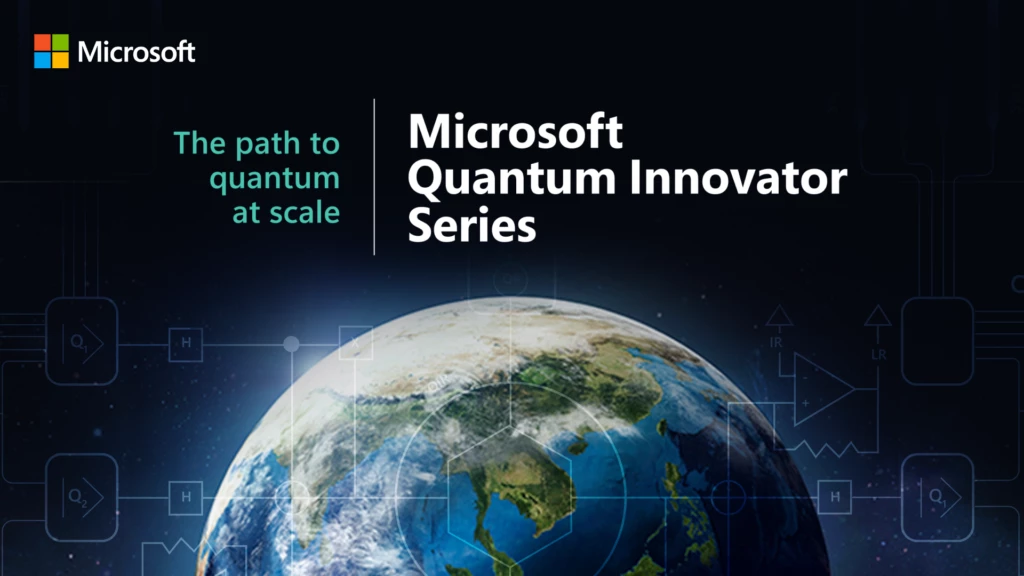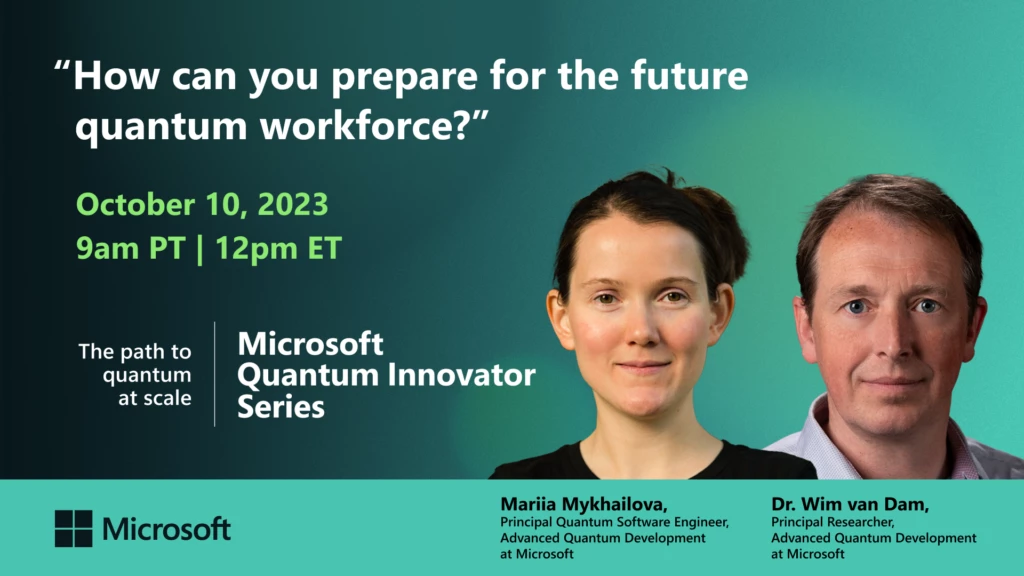
Announcing a new season of Microsoft Quantum Innovator Series Events
Get the inside, first-hand account of the Microsoft strategy to scaled quantum computing. In this series, you will hear directly from the Microsoft Azure Quantum scientists and leaders about the path to quantum at scale and how you can get involved today.
Why attend the next event?
- Be among the first to learn about recent advancements.
- Get inspired to drive quantum innovation in your organization.
- Discover how quantum will transform various industries in the coming years.

Episode 1 | October 10: How can you prepare for the future quantum workforce?
It will take the world’s collective genius to realize the full promise of quantum computing. With increasing private, government, and academic investment in quantum research, now is the perfect time for innovators and developers to get ahead of the curve and cultivate their quantum computing knowledge and skills. Join this webinar to learn how Microsoft can help you become quantum-ready with world-class programming tutorials and a broad variety of learning materials and tools available through Azure Quantum.
Speakers:
Dr. Wim van Dam, Principal Researcher, Advanced Quantum Development, Microsoft
Wim van Dam is a Principal Researcher in the Advanced Quantum Development group at Microsoft. His research focuses on quantum computation and quantum communication and his main interest is the development of new quantum algorithms that deliver a significant acceleration when compared with traditional, classical algorithms. Before joining Microsoft, Dr. van Dam was Head of Quantum Algorithms at QC Ware and a professor in the Departments of Computer Science and Physics at University of California, Santa Barbara.
Mariia Mykhailova, Principal Quantum Software Engineer, Advanced Quantum Development, Microsoft
Mariia Mykhailova is a Principal Software Engineer in the Advanced Quantum Development group at Microsoft. She works on developing software for fault-tolerant quantum computation. Mariia is also a part-time lecturer at Northeastern University, teaching Introduction to Quantum Computing since 2020, and the author of O’Reilly book, “Q# Pocket Guide”.

Episode 2 | Nov 28: How can Azure Quantum Elements accelerate scientific discovery today and in the future?
Catalyzed by a new generation of AI, the world’s most advanced AI models are powering breakthroughs in chemistry and helping to usher in a new era of scientific discovery that will transform society. Even bigger breakthroughs will come with quantum supercomputing. Join this webinar to learn how Microsoft is accelerating chemistry and materials science with Azure Quantum Elements and how industry innovators are transforming their research and development with quantum computing today.
About the speaker:
Dr. Nathan Baker, Head of Partnerships for Chemistry and Materials, Azure Quantum, Microsoft
Nathan Baker is the Head of Partnerships for Chemistry and Materials, Azure Quantum at Microsoft. Previously, Nathan was a Laboratory Fellow in the Physical and Computational Sciences Directorate at Pacific Northwest National Laboratory (PNNL) and a faculty member at Washington University in St. Louis with roles that included Associate Professor (tenured) of Biochemistry and Molecular Biophysics and Director of the Biophysics PhD program. His research interests include the development of new algorithms in applied mathematics and data science to support applications in chemistry, biology, and other domains. Dr. Baker is a member of the Washington State Academy of Sciences, Fellow of the American Association for the Advancement of Science (AAAS), and a former Alfred P. Sloan Research Fellow.
Watch season one on-demand
Season one of the Quantum Innovator series kicked off with our first event, “Have you started developing for practical quantum advantage?” with Dr. Krysta Svore, distinguished engineer and VP of Quantum Software, Microsoft. During this webinar, you can:
- Learn what’s required for scalable quantum computing and what can be done now to get ready for it.
- See the new Azure Quantum Resource Estimator—the first end-to-end toolset that provides estimates for the number of logical and physical qubits as well as runtime required to execute quantum applications on post-NISQ, fault-tolerant quantum computers.
- Understand the number of qubits required for a quantum solution and the differences between qubit technologies.
- Explore how Microsoft is empowering innovators today by co-designing tools to optimize quantum solutions and to run small instances of algorithms on today’s diverse and maturing quantum systems and prepare for tomorrow’s scaled quantum computers.
- Participate in a live Q&A chat with the Azure Quantum team and be one of the first to hear about recent advancements.
About the speaker:
Krysta Svore | Distinguished Engineer and Vice President of Advanced Quantum Development, Quantum at Microsoft
Dr. Svore has published over 70 refereed articles and filed over 30 patents. She is a Fellow of the American Association for the Advancement of Science. She won the 2010 Yahoo! Learning to Rank Challenge with a team of colleagues, received an ACM Best of 2013 Notable Article award, and was recognized as one of Business Insider’s Most Powerful Female Engineers of 2018. A Kavli Fellow of the National Academy of Sciences, she also serves as an advisor to the National Quantum Initiative, the Advanced Scientific Computing Advisory Committee of the Department of Energy, and the ISAT Committee of DARPA, in addition to numerous other quantum centers and initiatives globally.
Microsoft Quantum Innovator Series: Why and what is the future of the topological qubit?
In our second episode from the first season, we focused on why Microsoft decided to design its quantum machine with topological qubits—an approach that is both more challenging and more promising than others—and what’s next for Microsoft’s hardware ambitions. This episode shares more about Microsoft’s quantum hardware journey, specifically touching on Microsoft’s physics breakthrough outlined in Dr. Nayak’s paper, and will also focus on the physics behind the topological qubit. Join our speaker Chetan Nayak, Technical Fellow and and VP of Quantum Hardware and Systems Engineering, Microsoft to:
- Learn about topological phases in physics and how they are applied to quantum computing.
- Explore how topological properties create a level of protection that can, in principle, help a qubit retain quantum information despite what’s happening in the environment around it.
- Understand the role of the topological gap and the recently discovered Majorana zero modes, and how together they impact a topological qubit’s stability, size, and speed.
- Learn how to examine the raw data and analysis from Microsoft’s hardware research on Azure Quantum.
- Use interactive Jupyter notebooks and explore what’s next in engineering the world’s first topological qubit.
- Participate in a live Q&A chat with the Azure Quantum team and be one of the first to hear about recent advancements.
About the speaker:
Chetan Nayak | Technical Fellow and VP of Quantum Hardware and Systems Engineering, Microsoft
Dr. Nayak is a pioneer of the study of quantum matter, including topological and non-equilibrium phases. He holds a bachelor’s degree from Harvard and a PhD in physics from Princeton. He was an assistant, associate, and full professor at UCLA, a visiting professor at Nihon University in Tokyo, and is a professor of physics at UCSB. Chetan was a trustee of the Aspen Center for Physics and an editor of Annals of Physics. He is a Fellow of the American Physical Society and a recipient of an Alfred P. Sloan Foundation Fellowship and a National Science Foundation CAREER award. He has published more than 150 refereed articles with more than 20,000 citations and has been granted more than 20 patents.
Microsoft Quantum Innovator Series: What kind of problems can we solve today with quantum simulation?
Our third episode from season one, featured Matthias Troyer, Microsoft Technical Fellow, discussing what kind of problems we can solve today with quantum simulation. Learn how years of Microsoft research reveal that the discovery of new chemicals, materials, and drugs that will ultimately help solve the world’s most challenging problems will greatly benefit from quantum computing. Dr. Troyer will explain what is happening today and how chemical and materials science innovators can get started on their quantum journey:
- Learn how real progress can be made today by combining high performance computing (HPC), state-of-the-art machine learning, and quantum knowledge to fundamentally transform our ability to model and predict the outcome of chemical processes.
- Get real-world insights from co-innovation projects happening right now with leading chemical and materials science companies around the world.
- Find out how researchers in chemical and materials fields can get started on their quantum journey today.
- Participate in a live Q&A chat with the Azure Quantum team and be one of the first to hear about recent advancements.
About the speaker:
Matthias Troyer | Technical Fellow and Corporate Vice President, Microsoft
Matthias Troyer is Technical Fellow and Corporate Vice President at Microsoft, working on the system architecture of quantum computers and their applications. After receiving his PhD in 1994 from ETH Zurich in Switzerland and spending time as a postdoc at the University of Tokyo he has been professor of Computational Physics at ETH Zurich until joining Microsoft in 2017. Matthias is a Fellow of the American Physical Society and President of the Aspen Center for Physics. He is recipient of the Hamburg Prize for Theoretical Physics and the Rahman Prize for Computational Physics of the American Physical Society “…for pioneering numerical work in many seemingly intractable areas of quantum…physics and for providing efficient sophisticated computer codes to the community.”
Learn more about Azure Quantum
- Learn more about Azure Quantum.
- Sign-up to learn more about the Azure Quantum Elements private preview.
- Visit the Azure Quantum Elements website.
- Check out our Microsoft Quantum Innovator Series webinars.
